Mo Yan 莫言 诺贝尔文学奖 作品介绍 中英文
- 格式:ppt
- 大小:254.50 KB
- 文档页数:9
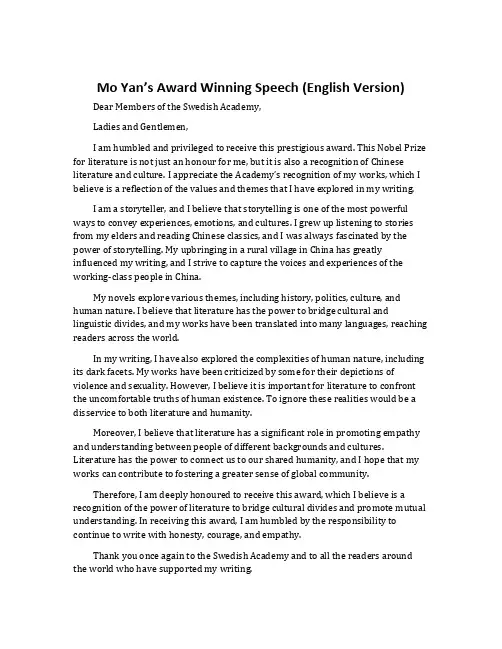
Mo Yan’s Award Winning Speech (English Version)Dear Members of the Swedish Academy,Ladies and Gentlemen,I am humbled and privileged to receive this prestigious award. This Nobel Prize for literature is not just an honour for me, but it is also a recognition of Chinese literature and culture. I appreciate the Academy’s recognition of my works, which I believe is a reflection of the values and themes that I have explored in my writing.I am a storyteller, and I believe that storytelling is one of the most powerful ways to convey experiences, emotions, and cultures. I grew up listening to stories from my elders and reading Chinese classics, and I was always fascinated by the power of storytelling. My upbringing in a rural village in China has greatly influenced my writing, and I strive to capture the voices and experiences of the working-class people in China.My novels explore various themes, including history, politics, culture, and human nature. I believe that literature has the power to bridge cultural and linguistic divides, and my works have been translated into many languages, reaching readers across the world.In my writing, I have also explored the complexities of human nature, including its dark facets. My works have been criticized by some for their depictions of violence and sexuality. However, I believe it is important for literature to confront the uncomfortable truths of human existence. To ignore these realities would be a disservice to both literature and humanity.Moreover, I believe that literature has a significant role in promoting empathy and understanding between people of different backgrounds and cultures. Literature has the power to connect us to our shared humanity, and I hope that my works can contribute to fostering a greater sense of global community.Therefore, I am deeply honoured to receive this award, which I believe is a recognition of the power of literature to bridge cultural divides and promote mutual understanding. In receiving this award, I am humbled by the responsibility to continue to write with honesty, courage, and empathy.Thank you once again to the Swedish Academy and to all the readers around the world who have supported my writing.。
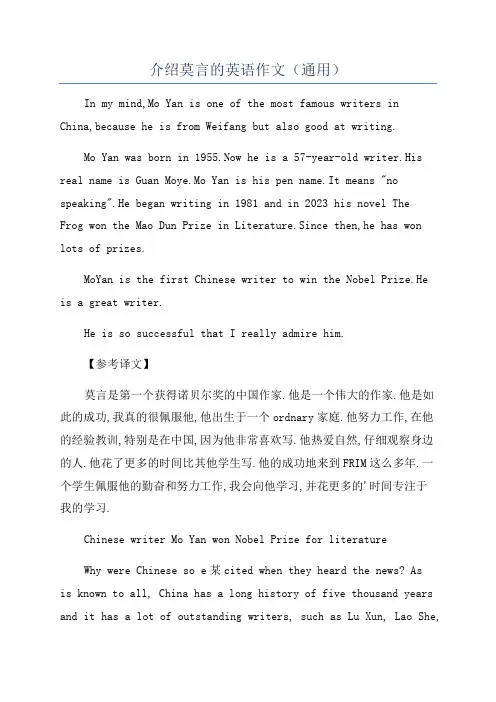
介绍莫言的英语作文(通用)In my mind,Mo Yan is one of the most famous writers in China,because he is from Weifang but also good at writing.Mo Yan was born in 1955.Now he is a 57-year-old writer.His real name is Guan Moye.Mo Yan is his pen name.It means "no speaking".He began writing in 1981 and in 2023 his novel TheFrog won the Mao Dun Prize in Literature.Since then,he has won lots of prizes.MoYan is the first Chinese writer to win the Nobel Prize.Heis a great writer.He is so successful that I really admire him.【参考译文】莫言是第一个获得诺贝尔奖的中国作家.他是一个伟大的作家.他是如此的成功,我真的很佩服他,他出生于一个ordnary家庭.他努力工作,在他的经验教训,特别是在中国,因为他非常喜欢写.他热爱自然,仔细观察身边的人.他花了更多的时间比其他学生写.他的成功地来到FRIM这么多年.一个学生佩服他的勤奋和努力工作,我会向他学习,并花更多的'时间专注于我的学习.Chinese writer Mo Yan won Nobel Prize for literatureWhy were Chinese so e某cited when they heard the news? Asis known to all, China has a long history of five thousand years and it has a lot of outstanding writers, such as Lu Xun, Lao She,Shen Congwen and so on. But none of them won Nobel Prize in the past. It is rea lly a pity that Chinese hasn’t won the world’s highest honor –Nobel Prize until Mo Yan’s winning.Because of the special meaning of Nobel Prize for Chinese,Mo Yan’s success brings a great influence both in people’s daily life and the nation’s international status. After Mo Yan won Nobel Prize, a lot of people want to follow the trend of buying his novels, therefore, his novels sell very well, manybookstores are out of stock. Besides, there is no doubt that his success will improve china’s international sta tus and more and more foreigners have an interesting in Chinese literature. As a result, the word will know china better.Above all, it is not hard to find that Mo Yan’s success is precious. But what’s the reason for his success.The Swedish Academy praised his work which "withhallucinatory realism merges folk tales, history and the contemporary".Mo Yan, is a famous contemporary Chinese writer. In2023, he became China's first writer who won the Nobel Literature Prize.As is known to all, graduated from Beijing Normal University, Mo Yan has won several awards.For e某ample,in 1997, his full-length novel "Big Breasts and Wide Hips" won the Da Jia Literature Prize, a money prize of 100,000 Yuan.As a matter of fact, Mo Yan won the Nobel Literature prize, can be said to be China's contemporary literature attained an important symbol of the world recognized. His works not only carries on the traditional culture, also refer to the foreign culture , not only reflects the folk characteristics, also has a distinctive modernity.Generally speaking, I believe that Chinese contemporary literature and art will have a better tomorrow.莫言是中国当代著名作家。
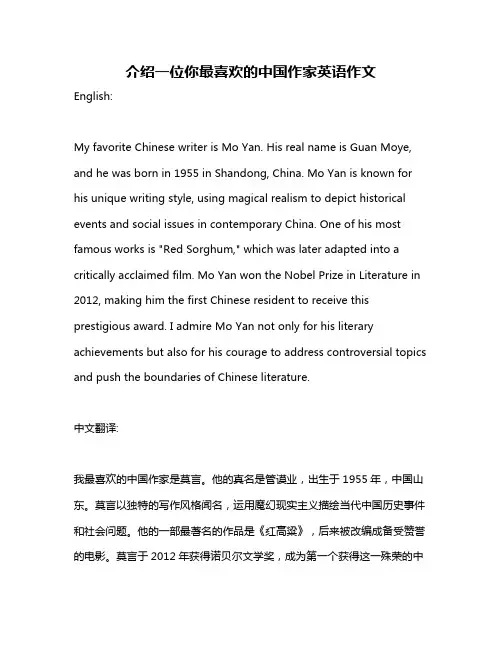
介绍一位你最喜欢的中国作家英语作文English:My favorite Chinese writer is Mo Yan. His real name is Guan Moye, and he was born in 1955 in Shandong, China. Mo Yan is known for his unique writing style, using magical realism to depict historical events and social issues in contemporary China. One of his most famous works is "Red Sorghum," which was later adapted into a critically acclaimed film. Mo Yan won the Nobel Prize in Literature in 2012, making him the first Chinese resident to receive this prestigious award. I admire Mo Yan not only for his literary achievements but also for his courage to address controversial topics and push the boundaries of Chinese literature.中文翻译:我最喜欢的中国作家是莫言。
他的真名是管谟业,出生于1955年,中国山东。
莫言以独特的写作风格闻名,运用魔幻现实主义描绘当代中国历史事件和社会问题。
他的一部最著名的作品是《红高粱》,后来被改编成备受赞誉的电影。
莫言于2012年获得诺贝尔文学奖,成为第一个获得这一殊荣的中国籍居民。
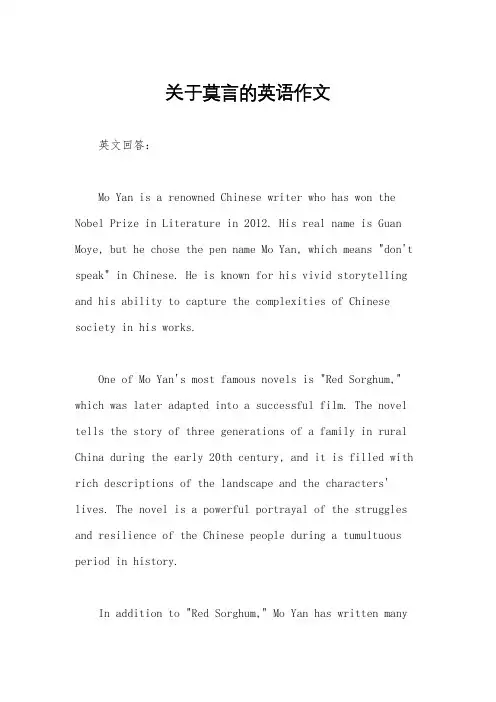
关于莫言的英语作文英文回答:Mo Yan is a renowned Chinese writer who has won the Nobel Prize in Literature in 2012. His real name is Guan Moye, but he chose the pen name Mo Yan, which means "don't speak" in Chinese. He is known for his vivid storytelling and his ability to capture the complexities of Chinese society in his works.One of Mo Yan's most famous novels is "Red Sorghum," which was later adapted into a successful film. The novel tells the story of three generations of a family in rural China during the early 20th century, and it is filled with rich descriptions of the landscape and the characters' lives. The novel is a powerful portrayal of the struggles and resilience of the Chinese people during a tumultuous period in history.In addition to "Red Sorghum," Mo Yan has written manyother acclaimed works, such as "Big Breasts and Wide Hips," "Frog," and "Life and Death Are Wearing Me Out." Hiswriting often explores themes of family, history, and the impact of political and social change on individuals. He is known for his ability to blend elements of magical realism with gritty realism, creating a unique and compelling literary style.Mo Yan's writing has been translated into many languages, allowing readers around the world to appreciate his storytelling and gain insight into Chinese culture and history. His works have earned him international acclaim and cemented his status as one of the most important contemporary Chinese writers.中文回答:莫言是一位著名的中国作家,他于2012年获得诺贝尔文学奖。
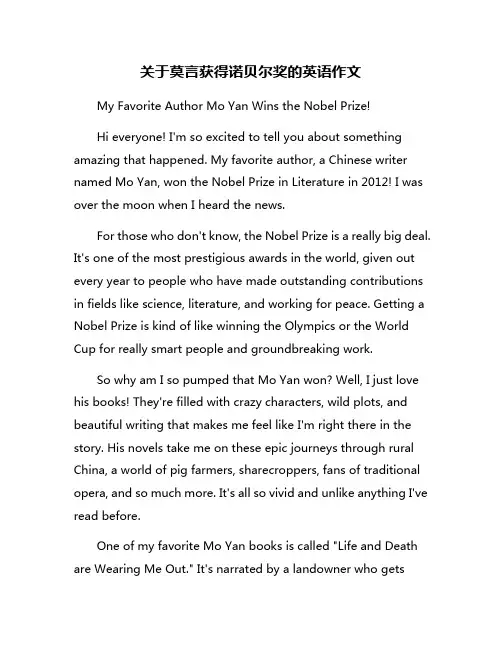
关于莫言获得诺贝尔奖的英语作文My Favorite Author Mo Yan Wins the Nobel Prize!Hi everyone! I'm so excited to tell you about something amazing that happened. My favorite author, a Chinese writer named Mo Yan, won the Nobel Prize in Literature in 2012! I was over the moon when I heard the news.For those who don't know, the Nobel Prize is a really big deal. It's one of the most prestigious awards in the world, given out every year to people who have made outstanding contributions in fields like science, literature, and working for peace. Getting a Nobel Prize is kind of like winning the Olympics or the World Cup for really smart people and groundbreaking work.So why am I so pumped that Mo Yan won? Well, I just love his books! They're filled with crazy characters, wild plots, and beautiful writing that makes me feel like I'm right there in the story. His novels take me on these epic journeys through rural China, a world of pig farmers, sharecroppers, fans of traditional opera, and so much more. It's all so vivid and unlike anything I've read before.One of my favorite Mo Yan books is called "Life and Death are Wearing Me Out." It's narrated by a landowner who getsreincarnated as a donkey, an ox, a pig, a dog, and a monkey after he's executed at the start of the Cultural Revolution. See what I mean about crazy plots? But it's also a really powerful story about the suffering of the Chinese people under harsh conditions. Mo Yan has a way of blending the fantastical with brutal reality.Another book I adore is "Big Breasts and Wide Hips." Don't let the title fool you - it's actually about the different generations of women in a Chinese family and how their lives change over time. The way Mo Yan describes things like food, the countryside, and people's daily lives makes me feel like I'm right there experiencing it all. His writing is just magical.I think what I love most about Mo Yan is how he takes really serious topics like poverty, oppression, and China's tumultuous history, and he makes them so engaging to read about by filling his stories with humor, imagination, and unforgettable characters. His books open up this whole other world for me as a reader.So you can understand why I was absolutely stoked when I found out Mo Yan had won the Nobel Prize. To me, it was like the grown-ups had finally recognized how brilliant and important this author is. When they announced it, the Nobel committeecalled Mo Yan a "master storyteller" who writes "hallucinatory realism" that merges "folk tales, history and the contemporary." Wow, right?Of course, not everyone was happy about Mo Yan's win. Some people criticized him for being too cozy with China's government and not challenging them more directly on issues like censorship and human rights. There was a lot of controversy and heated debates surrounding the decision.Personally, while I absolutely believe in freedom of speech, I don't think Mo Yan's books were the right place for direct political criticism. To me, his stories are more focused on giving voice to the everyday people of rural China and shining a light on their suffering, hopes, and humanity in really creative ways. But I respect that some people had different expectations.At the end of the day, I'm just thrilled that one of my favorite authors, whose books have brought me so much joy, got recognized on the biggest possible stage. Mo Yan's Nobel Prize win made me want to curl up and reread all his novels again. It was like the whole world was finally being let in on this amazing literary secret.Since then, I've tried to read as many interviews and biographical details about Mo Yan as I can find. I was reallystruck by how he drew inspiration from his own life growing up poor in a rural village, joining the People's Liberation Army, and working all kinds of jobs like cattle feeding and cotton picking before becoming a writer. His humble beginnings and exposure to the simple, hardworking lives of farmers clearly shaped the vivid worlds he would later create in his fiction.Mo Yan once said "We have to choose between making ourselves understood, and adhering to the facts." I think his gift is making us understand the fundamental struggles and truths of the human experience, even if the details he conveys are exaggerated or imaginative. That's why his voice and stories continue to resonate so powerfully.I hope more and more people, kids and adults alike, discover the wonderfully weird and insightful literary worlds of Mo Yan. With his Nobel Prize, maybe it will inspire some of you to pick up one of his books. Who knows, you might just wind up falling in love with a surprise reincarnation storyline or an eccentric extended family like I did! Just get ready for your imagination to be blown wide open.。
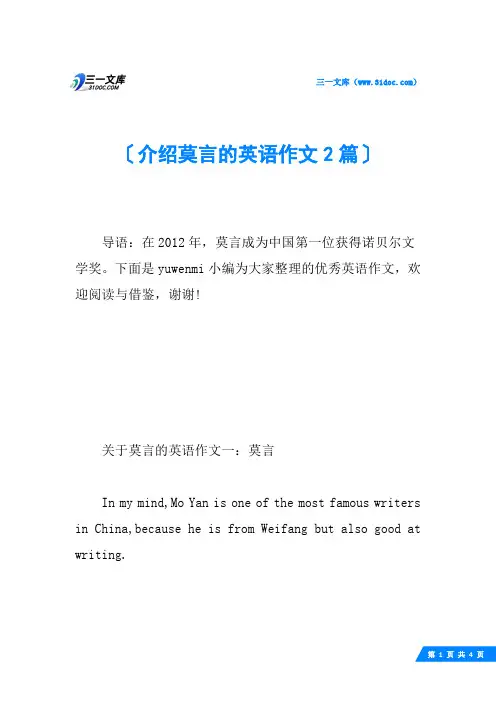
三一文库()〔介绍莫言的英语作文2篇〕导语:在2012年,莫言成为中国第一位获得诺贝尔文学奖。
下面是yuwenmi小编为大家整理的优秀英语作文,欢迎阅读与借鉴,谢谢!关于莫言的英语作文一:莫言In my mind,Mo Yan is one of the most famous writersin China,because he is from Weifang but also good at writing.第1页共4页Mo Yan was born in 1955.Now he is a 57-year-oldwriter.His real name is Guan Moye.Mo Yan is his penname.It means "no speaking".He began writing in 1981and in 2011 his novel The Frog won the Mao Dun Prizein Literature.Since then,he has won lots of prizes.In 2012,Mo Yan won the Nobel Prize inLiterature.I'm proud of him,because I come from Weifang as well.关于莫言的英语作文二:莫言MoYan is the first Chinese writer to win the Nobel Prize.He is a great writer.He is so successful that I really admire him.He was born in an ordnary family.He worked hard at24。
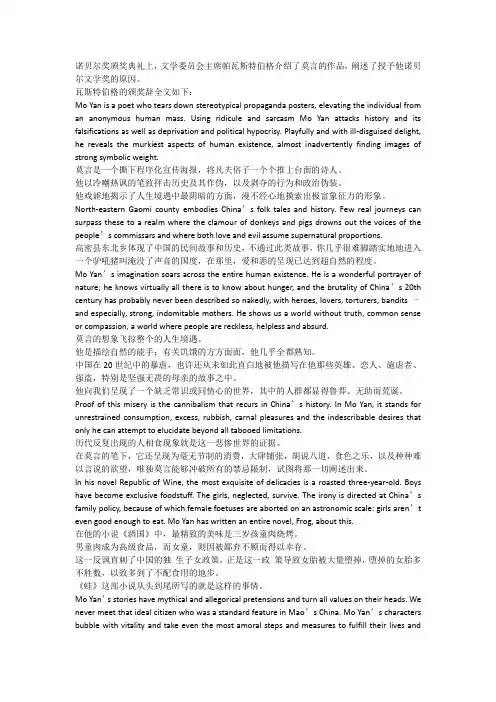
诺贝尔奖颁奖典礼上,文学委员会主席帕瓦斯特伯格介绍了莫言的作品,阐述了授予他诺贝尔文学奖的原因。
瓦斯特伯格的颁奖辞全文如下:Mo Yan is a poet who tears down stereotypical propaganda posters, elevating the individual from an anonymous human mass. Using ridicule and sarcasm Mo Yan attacks history and its falsifications as well as deprivation and political hypocrisy. Playfully and with ill-disguised delight, he reveals the murkiest aspects of human existence, almost inadvertently finding images of strong symbolic weight.莫言是一个撕下程序化宣传海报,将凡夫俗子一个个推上台面的诗人。
他以冷嘲热讽的笔致抨击历史及其作伪,以及剥夺的行为和政治伪装。
他戏谑地揭示了人生境遇中最阴暗的方面,漫不经心地摸索出极富象征力的形象。
North-eastern Gaomi county embodies China’s folk tales and history. Few real journeys can surpass these to a realm where the clamour of donkeys and pigs drowns out the voices of the people’s commissars and where both love and evil assume supernatural proportions.高密县东北乡体现了中国的民间故事和历史,不通过此类故事,你几乎很难脚踏实地地进入一个驴吼猪叫淹没了声音的国度,在那里,爱和恶的呈现已达到超自然的程度。
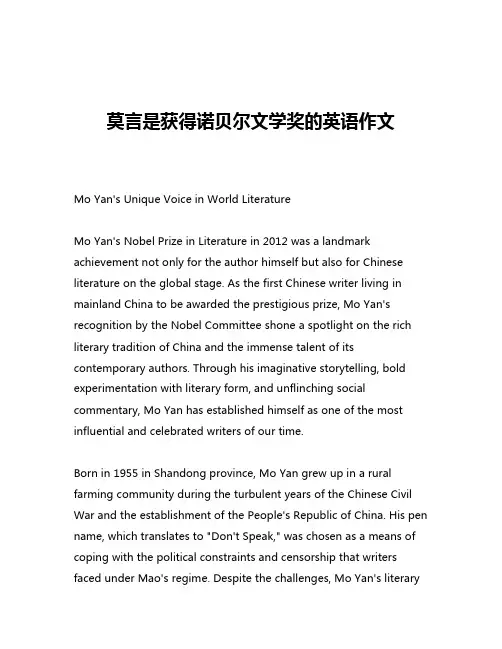
莫言是获得诺贝尔文学奖的英语作文Mo Yan's Unique Voice in World LiteratureMo Yan's Nobel Prize in Literature in 2012 was a landmark achievement not only for the author himself but also for Chinese literature on the global stage. As the first Chinese writer living in mainland China to be awarded the prestigious prize, Mo Yan's recognition by the Nobel Committee shone a spotlight on the rich literary tradition of China and the immense talent of its contemporary authors. Through his imaginative storytelling, bold experimentation with literary form, and unflinching social commentary, Mo Yan has established himself as one of the most influential and celebrated writers of our time.Born in 1955 in Shandong province, Mo Yan grew up in a rural farming community during the turbulent years of the Chinese Civil War and the establishment of the People's Republic of China. His pen name, which translates to "Don't Speak," was chosen as a means of coping with the political constraints and censorship that writers faced under Mao's regime. Despite the challenges, Mo Yan's literarycareer blossomed, and he has since authored dozens of novels, short stories, and novellas that have captivated readers around the world.One of the hallmarks of Mo Yan's writing is his masterful use of magical realism, a literary style that blends elements of the real and the fantastical. In novels like "Red Sorghum" and "Life and Death are Wearing Me Out," Mo Yan creates vividly imagined worlds that seamlessly incorporate supernatural occurrences and mythical figures alongside realistic depictions of rural Chinese life. This stylistic approach allows him to explore complex themes of history, identity, and the human condition through the lens of the extraordinary.In "Red Sorghum," for example, Mo Yan chronicles the lives of several generations of a family living in Shandong province, weaving together personal narratives with the tumultuous events of the Second Sino-Japanese War. The novel's protagonist, a young woman named Yu Zhan'ao, navigates a landscape filled with violence, hardship, and the supernatural, including a mysterious ancestor who appears to her in the form of a sorghum plant. Through Yu's eyes, Mo Yan offers a powerful and unflinching portrayal of the resilience and determination of the Chinese people in the face of adversity.Similarly, in "Life and Death are Wearing Me Out," Mo Yan employs the device of reincarnation to explore the sweeping changes thatChina underwent during the 20th century. The novel's central character, Ximen Nao, is a wealthy landowner who is executed during the Land Reform movement and then reborn as a series of animals, including a donkey, an ox, a pig, and a dog. As Ximen Nao experiences these successive reincarnations, he bears witness to the tumultuous political and social upheavals that transformed China, from the establishment of the People's Republic to the Cultural Revolution and beyond.What makes Mo Yan's use of magical realism so compelling is his ability to ground these fantastical elements in the gritty realities of rural Chinese life. His characters, whether human or animal, are richly drawn and emotionally resonant, their struggles and triumphs mirroring the broader experiences of the Chinese people. By blending the mythical and the mundane, Mo Yan creates a literary universe that is both deeply personal and profoundly universal.In addition to his mastery of magical realism, Mo Yan is also known for his bold experimentation with literary form and structure. In novels like "Big Breasts and Wide Hips" and "Sandalwood Death," he challenges traditional narrative conventions, weaving together multiple perspectives, time periods, and genres to create works that are both intellectually and emotionally demanding.In "Sandalwood Death," for instance, Mo Yan constructs a layerednarrative that incorporates elements of historical fiction, operatic performance, and political commentary. The novel's central event is the execution of a Boxer Rebellion leader, but Mo Yan uses this as a springboard to explore the complex interplay between individual and collective identity, the role of art and performance in society, and the enduring legacy of China's turbulent history.Similarly, in "Big Breasts and Wide Hips," Mo Yan employs a non-linear structure that jumps between different time periods and characters, creating a sprawling, multigenerational saga that defies easy categorization. By challenging the boundaries of traditional storytelling, Mo Yan invites readers to engage with his work in new and innovative ways, ultimately leading them to a deeper understanding of the complexities of the human experience.Underlying the formal and stylistic innovation of Mo Yan's writing is a deep commitment to social and political commentary. Throughout his oeuvre, he grapples with the profound changes and upheavals that have shaped modern China, from the ravages of war and political upheaval to the rapid industrialization and urbanization that have transformed the country's social fabric.In novels like "The Republic of Wine" and "Frog," Mo Yan offers unflinching critiques of government corruption, the abuse of power, and the human toll of China's one-child policy. Yet he does so with anuance and complexity that resists simplistic moralizing or didacticism. Instead, Mo Yan presents his readers with a multifaceted portrait of the challenges and contradictions inherent in China's transformation, inviting them to draw their own conclusions about the nature of power, justice, and human rights.Ultimately, what sets Mo Yan apart as a literary giant is his ability to transcend the boundaries of national and cultural identity, crafting works that resonate with readers around the world. By drawing on the rich literary traditions of China while also incorporating universal themes and archetypes, Mo Yan has established himself as a truly global writer, one whose influence and impact will continue to be felt for generations to come.The recognition of his talents with the Nobel Prize in Literature was a watershed moment not only for Mo Yan himself but for the entire landscape of world literature. As the first Chinese writer living in mainland China to receive this prestigious honor, Mo Yan's achievement has helped to shatter long-held perceptions of Chinese literature as insular or inaccessible to Western audiences. Instead, his work has demonstrated the profound universality and relevance of the Chinese literary tradition, offering readers a window into the diverse experiences and perspectives that define the human condition.In the years since his Nobel Prize win, Mo Yan's influence has only continued to grow, with his novels and short stories being translated into dozens of languages and finding devoted readerships around the globe. His legacy as a literary trailblazer and a champion of the power of storytelling will undoubtedly endure, inspiring new generations of writers and readers to engage with the rich tapestry of Chinese culture and history.。
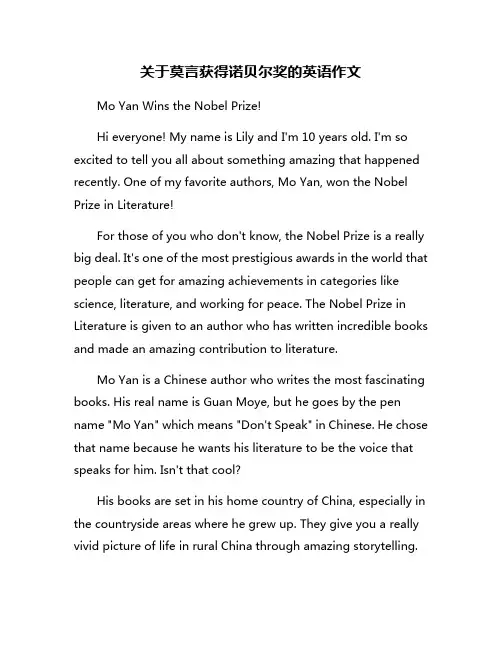
关于莫言获得诺贝尔奖的英语作文Mo Yan Wins the Nobel Prize!Hi everyone! My name is Lily and I'm 10 years old. I'm so excited to tell you all about something amazing that happened recently. One of my favorite authors, Mo Yan, won the Nobel Prize in Literature!For those of you who don't know, the Nobel Prize is a really big deal. It's one of the most prestigious awards in the world that people can get for amazing achievements in categories like science, literature, and working for peace. The Nobel Prize in Literature is given to an author who has written incredible books and made an amazing contribution to literature.Mo Yan is a Chinese author who writes the most fascinating books. His real name is Guan Moye, but he goes by the pen name "Mo Yan" which means "Don't Speak" in Chinese. He chose that name because he wants his literature to be the voice that speaks for him. Isn't that cool?His books are set in his home country of China, especially in the countryside areas where he grew up. They give you a really vivid picture of life in rural China through amazing storytelling.His writing style mixes realism with allegory and satire, which makes his books so unique and interesting to read.Some of his most popular books are Red Sorghum, Big Breasts & Wide Hips, and The Republic of Wine. I've read Red Sorghum and I absolutely loved how he used the sorghum plant as a symbol throughout the whole book. It follows families in a Chinese village through several decades and has elements of drama, comedy, and even a little bit of magic realism thrown in. So creative!Mo Yan was awarded the Nobel Prize "for his hallucinatory realism which amalgamates folk tales, history and the contemporary." That's a fancy way of saying he blends old folk stories with real history and modern life in his books. The Nobel committee praised his ability to capture people's struggles and use allegory to represent big issues in society.When Mo Yan found out he had won, he was so humble and grateful. He said "For a writer, the Nobel Prize is like a dream." As an elementary student, I can't even imagine what that incredible honor must feel like for him after decades of hard work. I'm so happy for him!Some critics argue that Mo Yan's works are too allegorical and difficult for the average reader to understand. They say theglobal significance of his writing is debatable. But in my opinion, any book that sparks curiosity, promotes deeper thinking, and shines a light on important issues is valuable literature.I think Mo Yan winning the Nobel Prize is amazing for a few reasons. First, it brings worldwide recognition to an extremely talented author. His unique storytelling style and fascinating perspectives deserve to be celebrated on a global stage. It's awesome that more people around the world will discover his books because of this prestigious award.Secondly, I love that the Nobel committee chose to honor literature from China. For too long, many people have overlooked or underappreciated the rich literary traditions and influential writers coming from Asia. Awarding the Nobel to Mo Yan highlights the universal significance of Chinese literature and culture. It sends the message that impactful stories can come from any country.Finally, as an aspiring young writer myself, Mo Yan's achievement inspires me so much. It shows that with enough hard work, creativity and passion for your craft, you can accomplish amazing things nomatter where you come from. His Nobel win is a bright beacon of hope for all young writers and artists dreaming of creating something meaningful.In the weeks since Mo Yan won the Nobel Prize, I've been devouring his books even more fervently. Each time I read his magical words that transport me into the rural Chinese villages he depicts so vividly, I gain a deeper appreciation for his literary mastery. I'm in awe of how he takes simple elements of everyday life and imbues them with profound symbolic meaning using his unique storytelling genius.I have so much respect and admiration for Mo Yan and I'm thrilled that he's receiving this incredible recognition from the Nobel committee. He is living proof that literature has the power to transcend cultural boundaries and reveal greater universal truths about the human experience that unite us all.I hope that after reading this essay, you've learned a little bit about why Mo Yan's Nobel Prize win is so inspiring and important. Maybe you'll even pick up one of his books and experience the enchanting world of his literary works for yourself. Whether you're a diehard book lover like me or just a casual reader, I have a feeling Mo Yan's imaginative writing will captivate your mind and soul.At the end of the day, that's what timeless literature is all about - igniting our hearts and minds in a way that Changes us forever. Thanks to Mo Yan and authors like him who create thosetransformative reading experiences. Congratulations again to this legendary literary icon!。
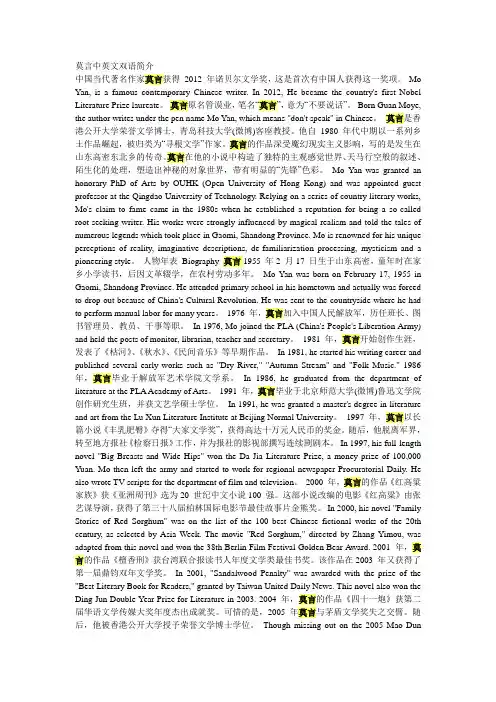
莫言中英文双语简介中国当代著名作家莫言获得2012 年诺贝尔文学奖,这是首次有中国人获得这一奖项。
Mo Yan, is a famous contemporary Chinese writer. In 2012, He became the country's first Nobel Literature Prize laureate。
莫言原名管谟业,笔名“莫言”,意为“不要说话”。
Born Guan Moye, the author writes under the pen name Mo Yan, which means "don't speak" in Chinese。
莫言是香港公开大学荣誉文学博士,青岛科技大学(微博)客座教授。
他自1980 年代中期以一系列乡土作品崛起,被归类为“寻根文学”作家。
莫言的作品深受魔幻现实主义影响,写的是发生在山东高密东北乡的传奇。
莫言在他的小说中构造了独特的主观感觉世界、天马行空般的叙述、陌生化的处理,塑造出神秘的对象世界,带有明显的“先锋”色彩。
Mo Yan was granted an honorary PhD of Arts by OUHK (Open University of Hong Kong) and was appointed guest professor at the Qingdao University of Technology. Relying on a series of country literary works, Mo's claim to fame came in the 1980s when he established a reputation for being a so-called root-seeking writer. His works were strongly influenced by magical realism and told the tales of numerous legends which took place in Gaomi, Shandong Province. Mo is renowned for his unique perceptions of reality, imaginative descriptions, de-familiarization processing, mysticism and a pioneering style。
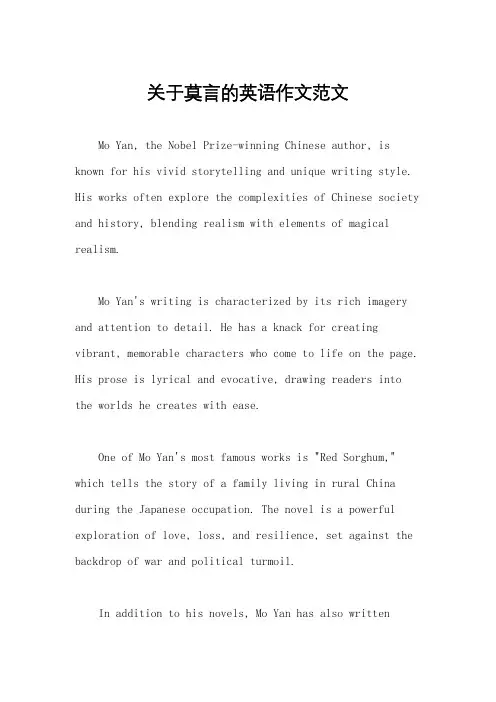
关于莫言的英语作文范文Mo Yan, the Nobel Prize-winning Chinese author, is known for his vivid storytelling and unique writing style. His works often explore the complexities of Chinese society and history, blending realism with elements of magical realism.Mo Yan's writing is characterized by its rich imagery and attention to detail. He has a knack for creating vibrant, memorable characters who come to life on the page. His prose is lyrical and evocative, drawing readers into the worlds he creates with ease.One of Mo Yan's most famous works is "Red Sorghum," which tells the story of a family living in rural China during the Japanese occupation. The novel is a powerful exploration of love, loss, and resilience, set against the backdrop of war and political turmoil.In addition to his novels, Mo Yan has also writtennumerous short stories and essays, showcasing his versatility as a writer. He is unafraid to tackle controversial subjects and push the boundaries of literary convention, earning him both praise and criticism from readers and critics alike.Overall, Mo Yan's impact on Chinese literature cannot be overstated. His unique voice and storytelling prowess have earned him a place among the literary greats, and his works continue to captivate readers around the world.。
名人莫言作文英语带中文Mo Yan, a renowned Chinese author and Nobel laureate in Literature, is celebrated for his unique narrative style and profound storytelling. His works often blend reality with folklore, history, and fantasy, creating a rich tapestry that reflects the complexities of Chinese society. Born in 1955 in Gaomi, Shandong Province, Mo Yan's journey to literary fame is both inspiring and remarkable.One of the hallmarks of Mo Yan's writing is his ability to incorporate elements of magical realism. In his most famous novel, *Red Sorghum*, he tells the story of a woman who becomes a strong figure during the Second Sino-Japanese War, illustrating not only the struggles of individuals but also the resilience of a community. His vivid descriptions and compelling characters draw readers into a world where the extraordinary becomes part of everyday life.Mo Yan's works often explore themes such as identity, tradition, and the impact of history on personal lives. He uses his background and experiences to reflect on the socio-political changes in China.Through his characters, he examines the tensions between tradition and modernity, as well as the complexities of human relationships. Mo Yan's ability to weave these themes into his narratives has earned him international acclaim and a dedicated readership.In addition to his literary achievements, Mo Yan's influence extends beyond the written word. He is a prominent figure in contemporary Chinese literature, encouraging new generations of writers to explore their own voices and stories. His success has also drawn attention to Chinese literature on the global stage, inspiring a greater appreciation for the richness of Chinese culture.In conclusion, Mo Yan stands as a testament to the power of storytelling. His works not only entertain but also provoke thought and reflection on the human condition. As a literary genius, he continues to inspire readers and writers alike, making significant contributions to both Chinese and world literature.中文翻译:莫言,是中国著名作家和诺贝尔文学奖得主,以其独特的叙事风格和深刻的故事讲述而闻名。
莫言介绍英语作文Mo Yan is a Chinese writer who won the Nobel Prize in Literature in 2012. He is known for his vivid storytelling and unique writing style that combines elements of magical realism with historical and social commentary.Born in 1955 in Shandong province, Mo Yan grew up during the Cultural Revolution and his early experiences greatly influenced his writing. He worked as a farmer, a soldier, and a factory worker before becoming a writer, and these diverse experiences are reflected in his novels and short stories.Mo Yan's most famous work is "Red Sorghum," which was later adapted into a successful film. The novel is set in a rural village in China and tells the story of three generations of a family during the early 20th century. It is a powerful and often brutal portrayal of life in rural China, with elements of folklore and magical realism woven into the narrative.In addition to "Red Sorghum," Mo Yan has written many other acclaimed works, including "Big Breasts and Wide Hips," "Frog," and "Life and Death Are Wearing Me Out." His writing often explores themes of family, history, and the impact of political and social change on ordinary people.Mo Yan's writing has been praised for its richly drawn characters, evocative descriptions of rural life, and its ability to blend the personal and the political. His work has been translated into many languages and has gained a global audience.Despite his international acclaim, Mo Yan has alsofaced criticism for his perceived closeness to the Chinese government and his reluctance to openly criticize its policies. However, he has defended his position as a writer, stating that his primary concern is to tell stories and create art, rather than to engage in overt political activism.Overall, Mo Yan is a significant figure in contemporaryChinese literature, and his work continues to be read and studied around the world for its insight into Chinese society and its powerful storytelling.。
北京时间2012年12月8日0时30分,诺贝尔文学奖获得者莫言在瑞典学院发表演讲,以下为演讲实录,英文由Howard Goldblatt翻译:尊敬的瑞典学院各位院士,女士们、先生们:Distinguished members of the Swedish Academy, Ladies and Gentlemen:通过电视或网络,我想在座的各位,对遥远的高密东北乡,已经有了或多或少的了解。
你们也许看到了我的九十岁的老父亲,看到了我的哥哥姐姐我的妻子女儿和我的一岁零四个月的外孙子,但是有一个此刻我最想念的人,我的母亲,你们永远无法看到了。
我获奖后,很多人分享了我的光荣,但我的母亲却无法分享了。
Through the mediums of television and the Internet, I imagine that everyone here has at least a nodding acquaintance with far-offNortheast Gaomi Township. You may have seen my ninety-year-old father, as well as my brothers, my sister, my wife and my daughter, even my granddaughter, now a year and four months old. But the person who is most on my mind at this moment, my mother, is someone you will never see. Many people have shared in the honor of winning this prize, everyone but her.我母亲生于1922年,卒于1994年。
她的骨灰,埋葬在村庄东边的桃园里。
莫言获诺贝尔文学奖英语作文In 2012, the renowned Chinese author Mo Yan was awarded the Nobel Prize in Literature for his work that "with hallucinatory realism merges folk tales, history, and the contemporary." Mo Yan, whose real name is Guan Moye, is known for his rich storytelling that delves into the complexities of Chinese society, often blending historical events with elements of surrealism and satire.Mo Yan's writing is celebrated for its ability to capture the essence of Chinese culture while exploring universal themes such as power, politics, and human nature. His most famous works include "Red Sorghum," "Big Breasts and Wide Hips," and "Frog," each offering a unique perspective on China's tumultuous past and present.The Nobel Prize in Literature recognized Mo Yan not only for his literary achievements but also for his courage in addressing sensitive subjects and challenging established norms. Through his writing, Mo Yan has shed light on the struggles and triumphs of the Chinese people, earning him both critical acclaim and controversy.Overall, Mo Yan's Nobel Prize win not only honored his contributions to world literature but also highlighted theimportance of storytelling in bridging cultural divides and fostering understanding among diverse audiences. His works continue to captivate readers around the globe, cementing his legacy as one of China's most influential contemporary writers.。
莫言莫言诺奖授奖词中文全文瑞典文学院诺奖委员会主席瓦斯特伯格:尊敬的国王和皇后陛下,尊敬的诺贝尔奖得主们,女士们先生们,莫言是个诗人,他扯下程式化的宣传画,使个人从茫茫无名大众中突出出来。
他用嘲笑和讽刺的笔触,攻击历史和谬误以及贫乏和政治虚伪。
他有技巧的揭露了人类最阴暗的一面,在不经意间给象征赋予了形象。
高密东北乡体现了中国的民间故事和历史。
在这些民间故事中,驴与猪的吵闹淹没了人的声音,爱与邪恶被赋予了超自然的能量。
莫言有着无与伦比的想象力。
他很好的描绘了自然;他基本知晓所有与饥饿相关的事情;中国20世纪的疾苦从来都没有被如此直白的描写:英雄、情侣、虐待者、匪徒--特别是坚强的、不屈不挠的母亲们。
他向我们展示了一个没有真理、常识或者同情的世界,这个世界中的人鲁莽、无助且可笑。
中国历史上重复出现的同类相残的行为证明了这些苦难。
对莫言来说,这代表着消费、无节制、废物、肉体上的享受以及无法描述的欲望,只有他才能超越禁忌试图描述。
在小说《酒国》中,最精致的佳肴是烧烤三岁儿童。
男童沦为食物;女童因为被忽视而得以幸存。
这是对中国计划生育政策的嘲讽,因为计划生育大量女胎被堕胎:女孩连被吃的资格都没有。
莫言为此写了一整本小说《蛙》。
莫言的故事有着神秘和寓意,让所有的价值观得到体现。
莫言的人物充满活力,他们甚至用不道德的办法和手段实现他们生活目标,打破命运和政治的牢笼。
《丰乳肥臀》是莫言最著名的小说,以女性视角描述了1960年的大跃进和大饥荒。
他讥讽了革命伪科学,就是用兔子给羊受精,同时不理睬所有的怀疑者,将他们当成右翼。
小说的结尾描述了九十年代的新资本主义,会忽悠的人靠卖化妆品富了起来,并想通过混种受精培育凤凰。
莫言生动的向我们展示了一个被人遗忘的农民世界,虽然无情但又充满了愉悦的无私。
每一个瞬间都那么精彩。
作者知晓手工艺、冶炼技术、建筑、挖沟开渠、放牧和游击队的技巧并且知道如何描述。
他似乎用笔尖描述了整个人生。
莫言介绍英语作文初二Mo Yan, a renowned Chinese novelist and the recipient of the Nobel Prize in Literature in 2012, is a figure of great significance in the literary world. Born in 1955 in Gaomi, Shandong Province, Mo Yan has been a prolific writer since his early years. His real name is Guan Moye, but he adopted the pen name "Mo Yan," which translates to "don't speak" in English, a reflection of his initial reluctance to express himself.Mo Yan's literary works often draw from his rural background and the history of China, blending realism with magical realism. His storytelling is characterized by a deep empathy for the common people and a critical eye towards social issues. His novel "Red Sorghum Clan" is perhaps his most famous work, which was later adapted into a successful film.In 2012, Mo Yan was awarded the Nobel Prize in Literature "for his work that with hallucinatory realism merges folk tales, history and the contemporary." This recognition not only brought him international fame but also highlighted the richness of Chinese literature on a global stage.Mo Yan's writing style is unique, often employing a rich and vivid language that paints a clear picture of the landscapes and people he writes about. His works are not just narratives but also a commentary on the human condition,exploring themes of love, war, and the passage of time.Despite the challenges he has faced, including periods of censorship, Mo Yan continues to write and inspire readers around the world with his profound insights and storytelling prowess. His contributions to literature serve as a testament to the power of the written word to transcend cultural boundaries and touch the hearts of people everywhere.。